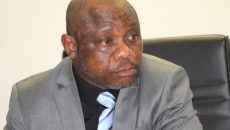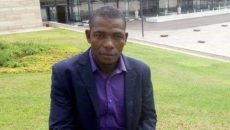BUCHANAN, Grand Bassa – Stakeholders in Liberia’s forest sector have concluded a meeting in Buchanan to discuss ways to manage sustainable and productive forests and reduce conflicts.
The regional dialogue brought together companies, national and community leaders, and was organized jointly by the National Union of Community Forest Development Committee, the National Union of Community Forest Management Body, the Liberia Timber Association, and the NGO Coalition of Liberia.
The European Union sponsored the gathering through its Non-State Actor Project implemented by VOSIEDA and Tropenbos International.
Participants were drawn from the forest sector in Grand Bassa, River Cess, Margibi, and Sinoe.
The discussions covered key areas, such as the roles and responsibilities of key forest stakeholders, benefit-sharing, and mechanisms in forest resources, as per the Community Rights and National Forest Reform Laws. Other topics were experienced sharing on noncompliance, interference and illegal logging, carbon credit, and dispute prevention and resolution mechanisms in forest governance.
The forum also included panel discussions on key topics, led by the Forestry Development Authority, civil society organizations, the National Benefit Trust Board, the Ministry of Finance and Development Planning, and members of the host organizations.
The manager of the E.U.’s Nonstate actor project at VOSIEDA, Abraham Billy, revealed that several communities had complained of noncompliance and illegal logging that was not being actively remedied by the proper authorities, including the FDA.
“Company complaints of chainsaw millers illegally logging in their concessions have been established, yet less or nothing has been done to address it,†Billy explained.
“Forest structures have reported constant interference of local authorities into their functions, thereby undermining their relationship with the companies and communities in which they serve.â€
He stressed that while there would always be conflicts associated with logging activities where concessions exist, it was important to handle those issues in the interests of affected parties, including the community and the government, as well as the concession.
He said resolving those conflicts was the very reason the key laws affecting the sector were introduced, including the Land Rights Act and the National Forestry Law.
“Despite the existence of these laws, forest communities have expressed displeasure in service delivery in keeping with the aspect of the social agreement of the concessions,†he added.
Meanwhile, Billy stressed the importance of addressing longstanding claims and counterclaims by companies and logging communities.
“Although this dialogue seeks to settle disputes, its paramount objective is to ensure compliance,†he said.
He said since the 2016/2017 fiscal year, the government has not provided affected communities their 30 percent of the land rental fees paid by concessions.
“The money that come from the land rental fees, the 100 percent is divided into three categories; 40 percent to national government, 30 percent to the affected community and 30 percent to the county. Those are the allocations that were done by law. But it has been very difficult for government to live up to that,†he noted.
He disclosed that the government has not made available the monies intended for communities for the last two years, on grounds that the communities have not been placed in the national budget.
“The fact that the government is not relaying to the community its portion, it means the government is also not in compliance with the law,†he said.
“If the laws are actually made and enforced by the government and the very government that should be implementing a portion of the law is not implementing it, then we say the government is also in violation of the law.â€
He said he hoped the dialogue would cement the relationship between companies and their affected communities, while also minimizing tensions and improving inclusiveness for marginalized and vulnerable groups of women and youth and build dignity for labor.
Another phase of the dialogue is expected to take place in Gbarnga, Bong. It will bring together stakeholders in Bong, Nimba, Lofa, Grand Cape Mount, and Gbarpolu.
Featured photo by Sampson David



